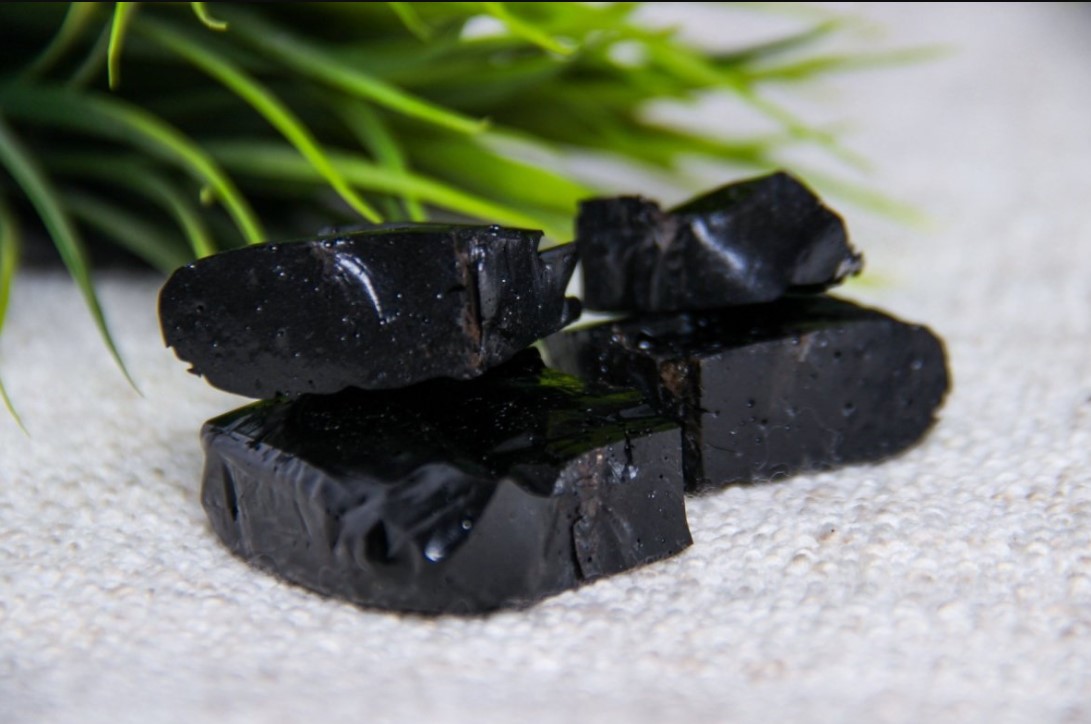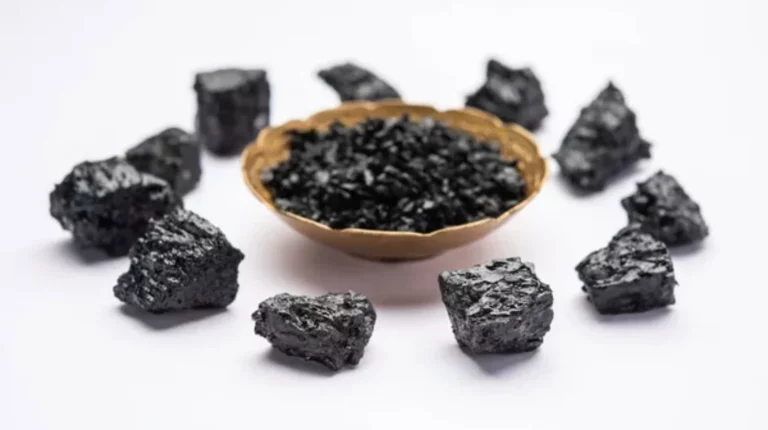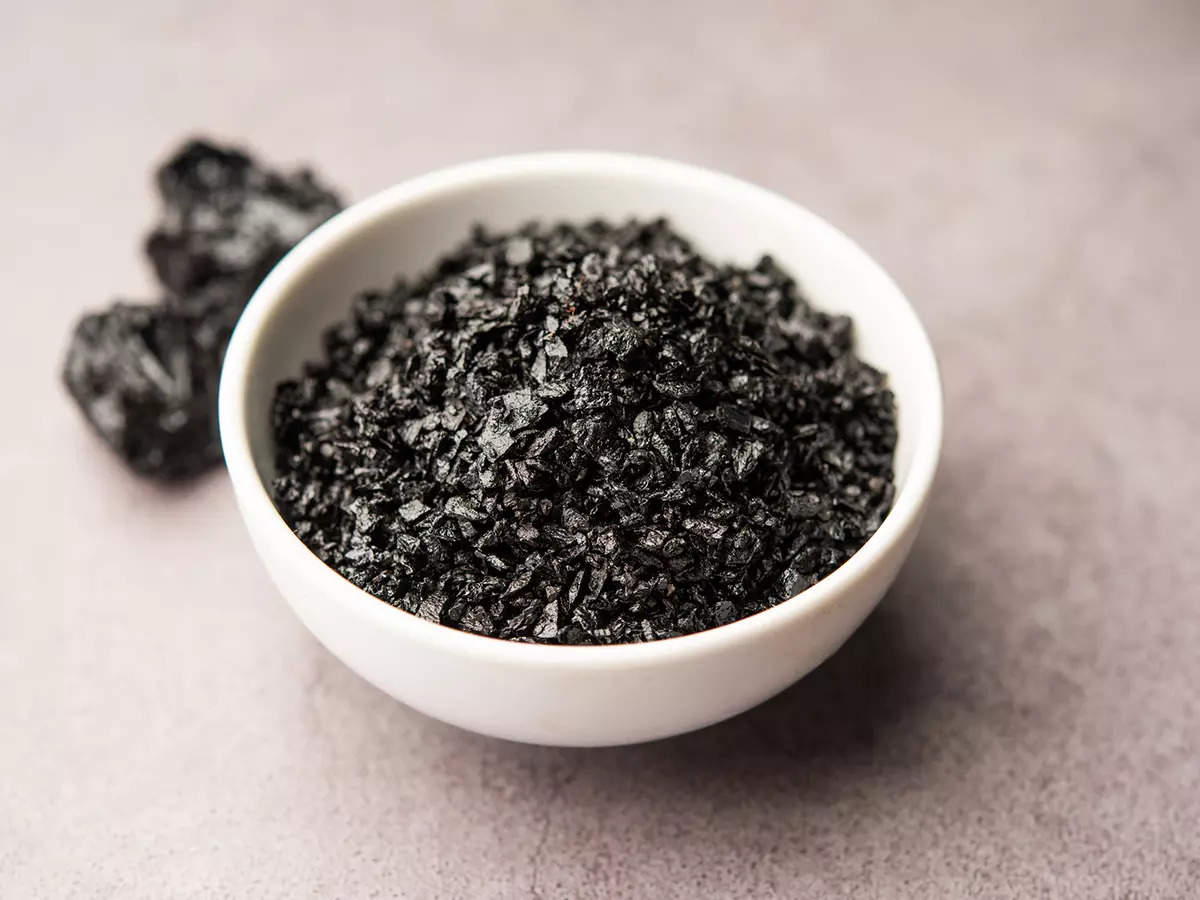Shilajit, often known by its alternative names “mummy” or “mum,” is a captivating natural resin distinguished by its deep blackish-brown color. This remarkable substance has a rich history in Ayurvedic medicine, which has been revered for centuries for its numerous health benefits. Primarily harvested from the majestic Himalayan mountains, shilajit can also be found in other high-altitude areas, including the rugged landscapes of Russia and Afghanistan. This unique resin is formed over centuries as plant matter decays and integrates with mineral-rich soil, creating a complex organic compound comprising over 40 essential minerals and elements. Among these, fulvic acid is known for its various health benefits. Get expert insights into Shilajit benefits, side effects, and uses.
Renowned for its impressive properties, shilajit is packed with powerful antioxidants, anti-inflammatory agents, and adaptogens, bolstering its reputation as a restorative and longevity-enhancing substance. While traditional medicine has long celebrated the benefits of shilajit, modern scientific research is now delving into its extensive effects on human health.
Exploring the Potential Health Benefits of Shilajit

Support for Testosterone Levels and Male Fertility
One of the most prominent benefits attributed to shilajit is its capacity to enhance male fertility through increased hormonal production. Research indicates that a daily intake of approximately 500 milligrams of shilajit can significantly elevate levels of dehydroepiandrosterone sulfate (DHEAS) and total testosterone in men. Elevated testosterone levels are associated with improved sperm quality and overall male reproductive health, positioning shilajit as a potential natural remedy for those experiencing fertility challenges.
Remarkable Anti-Inflammatory and Antioxidant Properties
Shilajit is a revered natural substance known for its remarkable antioxidant and anti-inflammatory properties, which have led to its reputation as a powerful ally in promoting longevity and combating the effects of aging. These antioxidants play a crucial role in safeguarding cells against oxidative stress, a harmful process that can contribute to the development of age-related diseases. By incorporating shilajit into one’s daily regimen, individuals may experience enhanced cellular turnover, a boost in collagen synthesis, and a reduction in oxidative damage. This makes shilajit an invaluable supplement for maintaining overall health and wellness and effectively addressing various inflammatory conditions that can arise with age. Its multifaceted benefits make shilajit a noteworthy addition to the pursuit of vibrant health and vitality.
Stress Relief as an Adaptogen
As an adaptogen, shilajit helps the body adjust to physical and emotional stressors. Some research has indicated that shilajit may reduce cortisol levels, a hormone closely associated with stress. While most studies in this field have been conducted on animals, the results suggest shilajit could be a natural method for managing anxiety and enhancing mental health. More research is needed to understand its effectiveness in humans completely.
Boost to Immune Health and Potential to Combat Viral Infections
The fulvic acid in shilajit is thought to have antiviral effects and enhance the immune system. Studies indicate that fulvic acid can reduce inflammation, act as a potent antioxidant, and support immune function. This range of effects may enable the body to fight against viral infections and possibly avoid illness. Nevertheless, further human research is needed to confirm the antiviral properties of shilajit definitively.
Positive Impact on Bone Health
Shilajit may also significantly promote bone health, particularly for individuals with diminished bone mineral density. A study conducted in 2022 revealed that postmenopausal women suffering from osteopenia—a precursor to osteoporosis—experienced substantial improvements in bone density after daily supplementation of shilajit over 11 months. Researchers attribute these benefits to shilajit’s capacity to enhance cell turnover, a crucial process for maintaining strong and healthy bones.
Possible Progression Slowing of Alzheimer’s Disease
Alzheimer’s disease, the most prevalent form of dementia, impacts memory, cognition, and behavior. The fulvic acid found in shilajit has exhibited the ability to reduce inflammation within the brain. It may hinder the accumulation of tau proteins, which can be detrimental to brain cells when aggregated. A recent study published in 2023 suggests that fulvic acid may help slow the progression of Alzheimer’s disease by safeguarding brain cells from harm.
Enhancement of Exercise Performance and Fatigue Reduction
Emerging evidence suggests that shilajit may benefit athletes by alleviating post-workout fatigue and augmenting muscular strength. Shilajit supplementation can enhance muscle elasticity, repair, and recovery, particularly during intense exercise regimens. As such, it may be an advantageous supplement for individuals who engage in regular physical activity, as it could bolster endurance and support quicker recovery after strenuous workouts.
Potential Inhibition of Cancer Cell Growth
Initial research suggests that the fulvic acid found in shilajit may hinder the growth of cancer cells, particularly in cases of breast cancer. A study conducted in 2020 revealed that shilajit could trigger apoptosis, or programmed cell death, in cancerous cells, which may help stop tumor development and spreading. Although these results are encouraging, further research is essential to verify these effects in humans and explore how shilajit could be incorporated into cancer prevention or treatment methods.
How to Use Shilajit: Forms, Dosage, and Safety

Exploring the Forms of Shilajit
Shilajit, a natural substance revered for its health-enhancing properties, is accessible in several distinct forms, each catering to different preferences and lifestyles. You can find it as capsules, which offer a convenient and precise dosage for those who prefer a straightforward approach. Alternatively, powders provide versatility, allowing you to dissolve them in warm water or milk, thus combining them with your favorite beverages. Lastly, resin is often regarded as the most potent form, requiring careful handling and preparation. Whether purchased from health food stores, online marketplaces, or select pharmacies, selecting a high-quality product is essential for maximizing its benefits.
Understanding Dosage Recommendations
When determining the proper dosage for shilajit, it’s important to note that these supplements are not regulated by the Food and Drug Administration (FDA), meaning there is no universally accepted dosage guideline. Clinical studies typically suggest a dosage range of 300 to 500 mg daily, which is safe and effective for most adults. However, individual needs may vary significantly. Therefore, it’s advisable to adhere to the manufacturer’s recommendations found on the product label or, even better, consult with a healthcare provider. They can help tailor a dosage that aligns with your health goals and circumstances.
Safety and Potential Side Effects
While shilajit is considered well-tolerated, the full spectrum of its side effects remains uncharted, mainly due to limited research. Although adverse reactions are rare, it is crucial to exercise caution, as some individuals may experience allergic reactions. Symptoms could range from mild irritation, such as skin hives and nausea, to more severe reactions, like chest pain, difficulty breathing, rapid heart rate, or facial swelling. Should any of these symptoms arise, seeking immediate medical assistance is paramount. Additionally, the potential for drug interactions has yet to be thoroughly documented, underscoring the importance of consulting a healthcare professional, particularly if you are currently taking other medications.
Ensuring Quality through Third-Party Testing
To safeguard your health and ensure product quality, look for shilajit supplements subjected to third-party testing. This process confirms that the supplement contains the ingredients listed on the label and is free from contaminants that could pose health risks. Recognized organizations such as NSF International, USP (United States Pharmacopeia), and ConsumerLab provide reliable testing services. Be wary of raw, unprocessed shilajit, as it may harbor harmful contaminants that can undermine its health benefits.
Addressing Toxicity and Overuse
A 2020 study found no significant adverse reactions at standard and elevated doses, but caution is always advisable. To ensure safe consumption, adhere to the recommended dosage established by your healthcare provider, as excessive use can lead to unforeseen complications.
Highlighting Potential Side Effects of Shilajit
– Uncertain Long-Term Safety: There is a scarcity of research on the long-term safety of shilajit, making it wise to monitor its effects in collaboration with a healthcare provider if you plan on using it for extended periods.
– Possible Allergic Reactions: While uncommon, some individuals may be sensitive to shilajit, with symptoms potentially manifesting as skin rashes, gastrointestinal upset, or, in rare cases, severe anaphylactic reactions.
– Digestive Disturbances: For a small subset of users, shilajit may cause mild digestive issues, such as nausea or diarrhea.
A Quick Overview of Shilajit’s Benefits and Considerations
Shilajit, an ancient and mineral-rich supplement, is celebrated for its potential health benefits. From its ability to enhance testosterone levels in men to its role in supporting bone health and possibly decelerating the progression of Alzheimer’s disease, its uses are diverse. While these benefits are promising, it is imperative to consult a healthcare professional before embarking on shilajit supplementation, given the limited research surrounding its side effects and potential interactions with other medications.
Conclusion
In summary, Shilajit is a powerful natural supplement with health properties. Its influence on inflammation, oxidative stress, bone health, and even cancer cells renders it an enticing choice for those seeking alternative wellness solutions. Nonetheless, responsible use and professional guidance are critical to harnessing its full potential safely.
FAQs
Q. What is Shilajit?
Answer: Shilajit is a natural resin that forms over many years from decomposed plant substances in mountainous areas, particularly the Himalayas. It consists of more than 40 minerals, fulvic acid, and various bioactive compounds that may offer several health advantages.
Q. How is Shilajit Traditionally Used?
Answer: For centuries, Shilajit has been utilized in Ayurvedic medicine to boost energy, improve physical performance, promote longevity, and address various health issues.
Q. What are Shilajit’s leading health benefits?
Answer: Some significant benefits of shilajit include:
– Elevation of testosterone levels and enhancement of male fertility
– Anti-inflammatory and antioxidant effects
– Reduction of stress and adaptable properties
– Potential support for immunity and antiviral effects
– Improvement of bone health and prevention of bone deterioration
– Possible assistance in decelerating the progression of Alzheimer’s disease
– Boosted exercise performance and less fatigue
– Inhibition of cancer cell proliferation in early studies
Q. How Should I Take Shilajit?
Answer: Shilajit comes in capsule, powder, and resin forms. Adhere to the recommended dosage indicated on the product label, usually about 300-500 mg daily, or consult a healthcare professional for tailored advice.
Q. Is Shilajit Safe for Long-Term Use?
Answer: Most people treat Shilajit well, but there is limited data on its long-term safety. It’s wise to consult a healthcare professional before starting prolonged use.
Q. Can Shilajit Cause Side Effects?
Answer: Side effects are uncommon but may involve mild digestive problems or allergic responses. Symptoms of an allergic reaction can include nausea, rashes, or even anaphylaxis in severe cases. It is advisable, to begin with a small dose to check for any adverse reactions.
Q. Does Shilajit Interact with Medications?
Answer: Research on the interactions between Shilajit and medications is limited. If you are taking other supplements or prescription medications, discussing this with a healthcare provider is advisable.
Q. How Do I Choose a High-Quality Shilajit Supplement?
Answer: Select products labeled “purified” with third-party testing certifications from reputable organizations like NSF, USP, or ConsumerLab. Avoid raw or unprocessed shilajit, as it may contain contaminants.
Q. What Precautions Should I Take Before Using Shilajit?
Answer: Consult a healthcare provider, especially if you are pregnant, nursing, or have pre-existing health issues. Do not exceed the recommended dosages; stop using it if any adverse effects occur.
Q. Is Shilajit Suitable for Everyone?
Answer: Shilajit may not be suitable for children, pregnant or breastfeeding women, and individuals with specific health conditions. Always seek advice from a healthcare provider before using it, mainly if you belong to these groups.
Q. Can Shilajit Help with Stress and Fatigue?
Answer: Yes, shilajit functions as an adaptogen, which may assist the body in managing stress and reducing fatigue, possibly enhancing overall energy levels and mental clarity.
Q. Can Shilajit Be Taken with Food?
Answer: Shilajit can generally be consumed with or without food, although taking it with milk or water is often suggested for better absorption. Follow the instructions on the product label for optimal results.
Q. How Quickly Will I See Results from Taking Shilajit?
Answer: The timeframe for noticing benefits varies by individual and depends on specific health objectives. Some may observe improvements within a few weeks, while others might need consistent use over several months to see effects.
Q. Does the FDA approve Shilajit?
Answer: the U.S. Food and Drug Administration (FDA) does not endorse or regulate Shilajit. Therefore, choosing reputable brands undergoing third-party testing is essential to ensure quality and safety.


